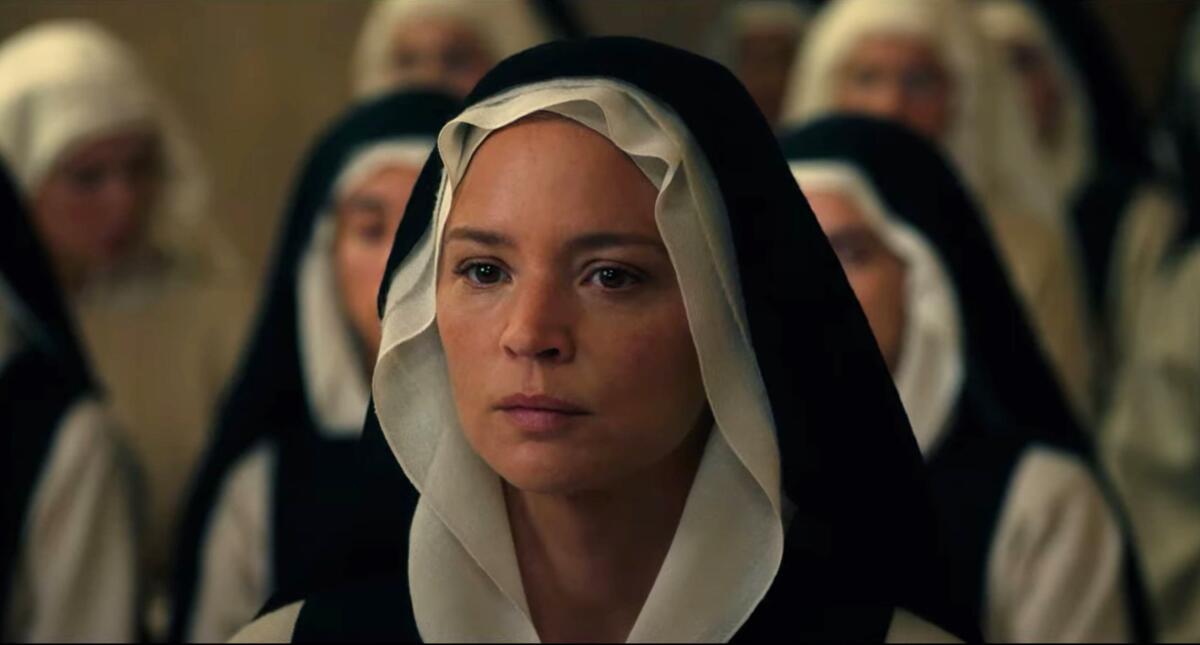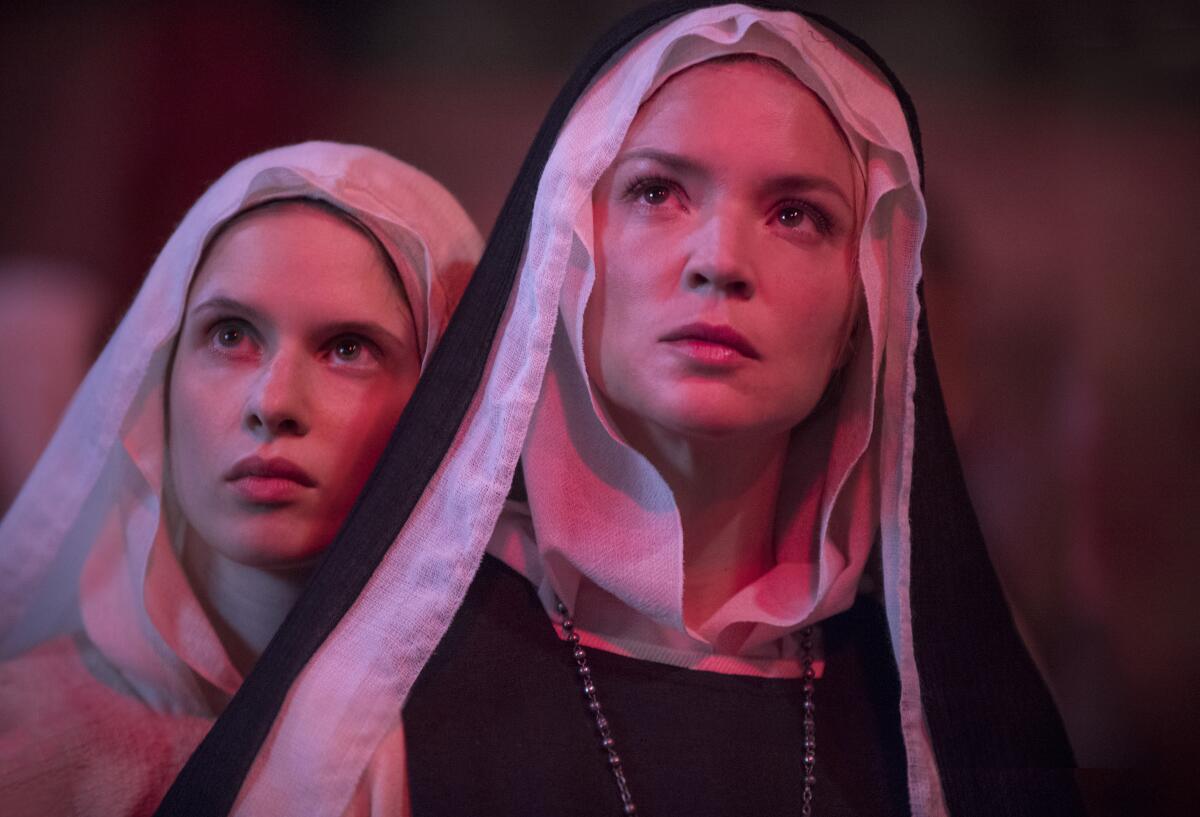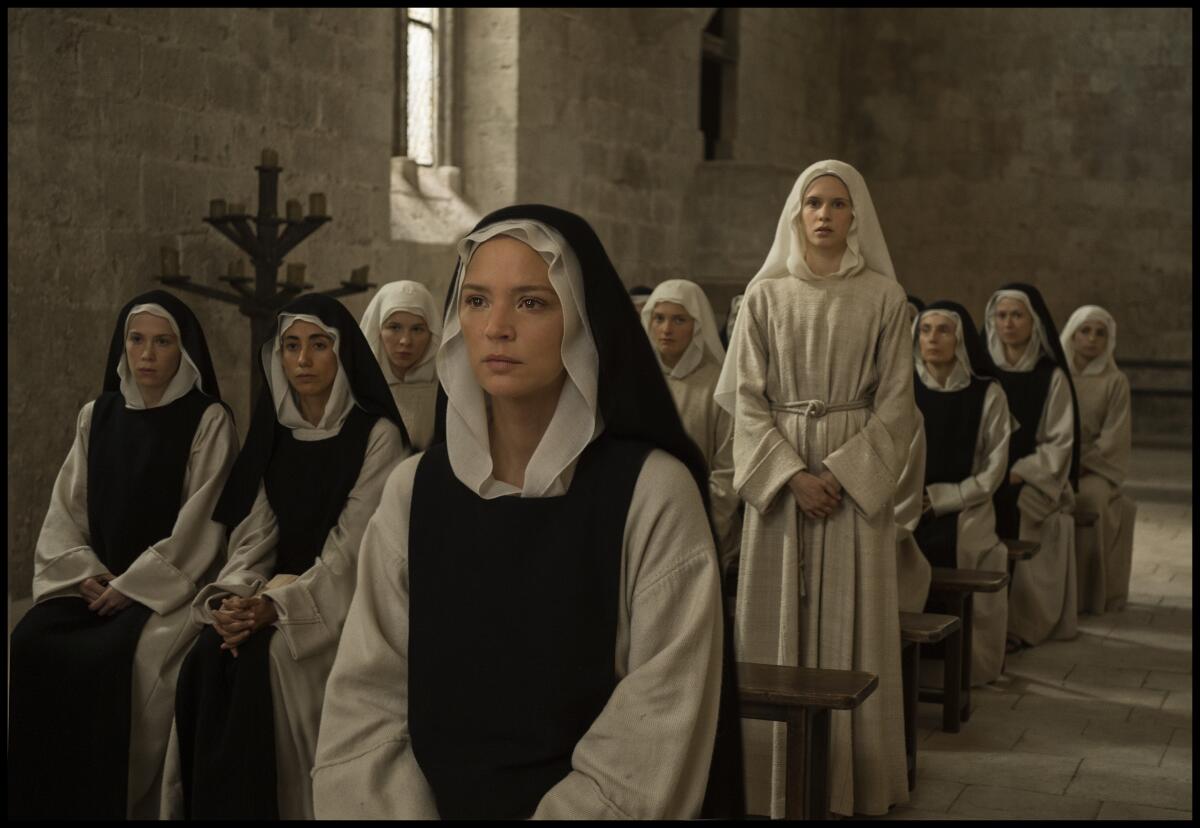Review: Sexy, satirical and spiritual, ‘Benedetta’ shows being a lesbian nun isn’t the wimple life

The Times is committed to reviewing theatrical film releases during the COVID-19 pandemic. Because moviegoing carries risks during this time, we remind readers to follow health and safety guidelines as outlined by the Centers for Disease Control and Prevention and local health officials.
In the first five minutes of “Benedetta,” Paul Verhoeven’s winking biographical fiction about the life and transgressions of a 17th century Italian nun, a bird defecates on a man’s eyeball and a street performer merrily lights his farts on fire. It’s gross. It’s funny. It’s oddly reassuring. Different directors have different kinks, and Verhoeven’s taste for the scatological has been one of his auteurial signatures; he is, after all, the filmmaker who indulged a scene of rectal torture in “Soldier of Orange” and dumped a vat of feces onto his World War II-era resistance heroine in “Black Book.”
And so no one should be shocked when his latest resistance heroine, Benedetta Carlini (Virginie Efira), and a fellow nun get acquainted side by side in a convent outhouse, complete with realistically muffled sound effects. It’s a veritable meet-toot. Verhoeven clearly wants us to laugh; the movie’s a gas. But he doesn’t mind if we think too — about the earthy realities of the body, the higher abstractions of the soul and all the thornily ambiguous ways they do and don’t connect. “Your worst enemy is your body,” a nun tells the young Benedetta when she first arrives at the convent. “Best not to feel at home in it.”
Eighteen years later, the adult Benedetta will both accept and reject this advice. She’s prone to frequent out-of-body experiences, beholding visions of a studly Jesus (Jonathan Couzinié) who is her savior, protector and, on occasion, seducer. But she also surrenders herself to the flesh, especially once she sets eyes on Bartolomea (Daphne Patakia), a battered urchin who, in one of Verhoeven’s wittier visuals, is swept into the convent amid a flock of sheep. Bartolomea herself may be something of a wolf, given the half-feral, half-mischievous twinkle in Patakia’s eyes and the hunger with which she turns Benedetta’s body into a vessel for pleasure as well as a temple of the spirit.

The assumption of “Benedetta,” by turns transgressive and matter-of-fact, is that sexual and spiritual epiphanies can be cut from the same cloth. Two things can coexist. Three things can coexist, if the concept of the trinity is to be believed (and full disclosure, I think it is). Verhoeven, now 83 and still operating with his trademark slipperiness of theme, tone and genre, treats “Benedetta” itself as a demonstration of this principle. Is it a takedown of religious patriarchy, an act of cinematic blasphemy or a sincere portrait of Christian devotion? A love story, a history lesson, a psychothriller or a sex farce? Si to all of the above — or rather, oui. (It’s an Italian-set drama but a French production.)
Benedetta herself appears to be one of the Middle Ages’ great multitaskers. Introduced as a precocious novitiate (played by Elena Plonka) at a Theatine convent in Pescia, Tuscany, she turns out to be a radiantly gifted actor, as we see from the lead role she’s assigned in a theatrical pageant. (That talent will come in useful down the road.) She’s a devoted sister and a born leader, dispensing practical wisdom and sometimes overzealous punishment. She might also be a prophet, anointed by God to receive his strange, often violent visions, some of which resemble Monty Python sketches and leave her marked with stigmata. Before long the force of these visions has swept her to the top of the convent hierarchy, displacing the longtime abbess, Sister Felicita (Charlotte Rampling).
Efira, a gifted actor herself (“Sibyl”), submits to these tribulations with wit, poise and surprising equanimity, given that she spends a lot of her time bellowing like Mercedes McCambridge in “The Exorcist” and bleeding from her wrists and ankles. Happily, she does none of those things during the movie’s abundant sex scenes, which are as candidly explicit as you’d expect from the director of “Basic Instinct,” “Showgirls” and “Starship Troopers,” here operating well beyond the jurisdiction of Hollywood censors. Benedetta and Bartolomea awaken and gratify each other’s desires, at times making strategic use of a sacred figurine that has been retooled to heighten their pleasure and, of course, to offend those with more parochial sensibilities in the audience.
I doubt that too many of those viewers will stumble onto “Benedetta” unawares, though if they do, they will not be alone in taking offense. Benedetta’s rise to power ignites the indignation of Sister Christina (Louise Chevillotte), who tries to out her as a charlatan and a heretic. The imposing Sister Felicita, whom the ever cliché-resistant Rampling invests with sardonic wit and moving vulnerability, seeks out an ally in the local nonce (a supremely punchable Lambert Wilson), who swiftly descends on the church with armed guards and genital-torture devices at the ready. The arrival of all these powerful men on the scene opens Pescia up to the threat of the plague that happens to be ravaging the Italian countryside. (Yes, “Benedetta” is also a pandemic movie.)

It also upsets the delicate balance of the matriarchal power structure that Verhoeven has spent much of the movie so carefully observing. Loosely inspired by Judith C. Brown’s 1986 book, “Immodest Acts: The Life of a Lesbian Nun in Renaissance Italy,” “Benedetta” immerses us in a cloistered world that nonetheless rebuffs our usual assumptions about the oppressive joylessness of monastic life, and not just because of all the sex. There may be hard manual labor and a little self-flagellation, but sardonic laughter sometimes erupts within these walls, as do wittily barbed negotiations over money. (“A convent is not a place of charity,” deadpans Sister Felicita, who demands an awfully high dowry for each “bride of Christ.”) Even the fluidity and mobility of the camerawork in these shadowy environs (the movie was shot by the gifted Jeanne Lapoirie) feels like a rejection of austerity.
So does Efira’s decidedly modern glamour, one of many reminders here that “Benedetta” is all too aware of its own artifice. Although less sustained or surprising than Verhoeven’s previous feature, “Elle” (2016), the movie similarly centers on an extraordinarily intelligent and imaginative heroine who finds herself in an impossible position — and who responds by flouting sexual norms, interrogating her own desires and ultimately threatening the status quo. Both movies derive much of their intrigue not only from Verhoeven’s filmmaking dexterity — for all that flatulence, he has a marvelously soft touch — but also his inscrutability. He can blur seriousness and irony until they seem almost indistinguishable.
Close followers of Verhoeven’s career will know him as an obsessive Christ scholar, having co-authored a book about the life of Jesus and spent many years trying to make a movie about him. That project never came to fruition, but the director’s spiritual curiosity lives on in “Benedetta.” He has found a heroine whose genuine fervor, though hardly beyond the reach of parody, also awakens his sympathy and his generosity. It takes a particular deftness for a movie to wear its intelligence and its irreverence so lightly. You might even call it grace.
‘Benedetta’
In French with English subtitles
Not rated
Running time: 2 hours, 6 minutes
Playing: Starts Dec. 3 in general release
More to Read
Only good movies
Get the Indie Focus newsletter, Mark Olsen's weekly guide to the world of cinema.
You may occasionally receive promotional content from the Los Angeles Times.











